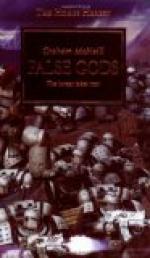“Why the deuce is she writing that skunk before she’s well out of town?” he thought, scanning the envelope with jealous eyes. Then he held it up to the light, but the thick paper told nothing of what was within. Frowning, he laid the letter down, fingered it, withdrew his itching hand, hesitated, and finally put it in his pocket.
Simpkins went straight from the office to his hotel, for, though he told himself that the letter contained some instructions which Mrs. Athelstone had forgotten to give Brander before leaving, he was anxious to see just how those instructions were worded. Alone in his little room, he ripped open the letter and ran over its two pages with bewilderment growing in his face. He finished by throwing it down on the table and exclaiming helplessly: “Well, I’ll be damned!”
The first sheet, without beginning or ending, contained only a line in Mrs. Athelstone’s handwriting, reading: “I had to leave in such a hurry that I missed seeing you.”
There was not an intelligible word on the second sheet; it was simply a succession of scrawls and puerile outline pictures, such as a child might have drawn.
To Simpkins’ first aggrieved feeling that his confidence had been abused, the certainty that he had stumbled on something of importance quickly succeeded. He concluded a second and more careful scrutiny of the letter with the exclamation, “Cipher! all right, all right,” and, after a third, he jumped up excitedly and rushed off to Columbia University.
An hour later, Professor Ashmore, whose well-known work on “Hieratic Writings” is so widely accepted an authority on that fascinating subject, looked across to Simpkins, who for some minutes had been sitting quietly in a corner of his study, and observed dryly:
“This is a queer jumble of hieroglyphics and hieratic writing, and is not, I should judge,” and his eyes twinkled, “of any great antiquity.”
“Quite right, Professor,” Simpkins assented cheerfully. “The lady who wrote it is interested in Egyptology, and is trying to have a little fun with me.”
“If I may judge from the letter, she seems to be interested in you as well,” the professor went on smilingly. “In fact, it appears to be—ahem—a love-letter.”
“Eh! What?” exclaimed Simpkins, suddenly serious, “Let’s have it.”
“Well, roughly, it goes something like this: ’My heart’s dearest, my sun, my Nile duck—the hours are days without thee, the days an aeon. The gods be thanked that this separation is not for long. For apart from thee I have no life. That thing that I have to do is about done. May the gods guard thee and the all-mother protect thee. I embrace thee: I kiss thine eyes and thy lips.’ That’s a fair translation, though one or two of the hieroglyphics are susceptible of a slightly different rendering; but the sense would not be materially affected by the change,” the Professor concluded.




